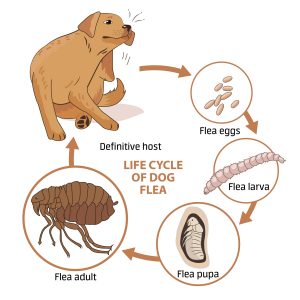THOSE LITTLE WHITE WORMS COULD BE FLEA LARVAE!
By Chris Williams on January 11, 2018.
My son just noticed some tiny white, wormy things in the dog’s bed. This may be out of your specialty area but do you think these are some kind of intestinal parasite that came out of the dog, or could they be some kind of insect that is chewing on the fabric in the dog bed? H. N., Hooksett, NH
You need to have someone take a look at this, maybe even one of our technicians if my hunch is right. I think what you’re seeing might be flea larvae. The question is: does your dog have a flea problem that you are aware of? If yes, then these are probably immature fleas. They don’t sound like clothes moth or carpet beetle larvae and we’re not qualified to diagnose a veterinary condition if they might be internal parasites.
F irst, here’s a refresher on flea biology. Most people, especially those with a pet, know what an adult flea looks like. Surprisingly though, many people don’t know that an immature flea looks nothing like the adult but is instead a tiny, ¼-inch whitish worm (see What Do Baby Fleas Look Like?)
irst, here’s a refresher on flea biology. Most people, especially those with a pet, know what an adult flea looks like. Surprisingly though, many people don’t know that an immature flea looks nothing like the adult but is instead a tiny, ¼-inch whitish worm (see What Do Baby Fleas Look Like?)
IMMATURE FLEAS DEVELOP IN YOUR PET’S BED
The other surprising thing about immature fleas is that they feed and develop not on the pet but primarily in places where your dog rests. This is because adult fleas lay eggs while they are on the dog. The eggs fall off wherever the dog happens to be at the time so it follows that most of them will end up hatching in the dog’s bed or on the couch where the dog lays, or in a similar place. When the eggs hatch, the wormlike larvae feed on bits of feces that drops from adult fleas and which is mostly dried blood.
TREATING YOUR PET IS ONLY HALF OF THE JOB
If you’re aware of a flea problem, you may have already treated your dog to kill adult fleas that are biting him. However, if you did not also treat your home and wash and vacuum pet bedding and resting areas, you only did half of the job. Treating the pet has no effect on immature fleas. They will continue to develop and pupate and turn into biting, adult fleas.
If our technician determines that the worms are indeed flea larvae, we can set you up with a flea program that will finish the other half of the job by treating the overlooked flea “hot spots” in your home. Eliminating the larvae, along with treating the pet, should break the flea cycle.
Give Colonial Pest a call today and if you’re going to wash the pet’s bedding before we get there, save some of the worms in a small vial of alcohol for our technician to inspect. For more information, see our Flea Elimination service page and these blogs: